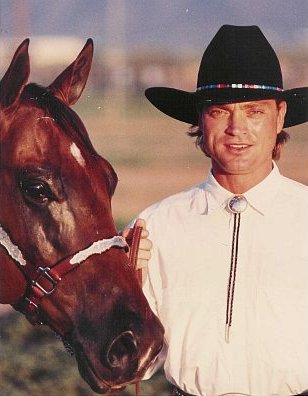
Greg Olson
August 25, 1960 - March 26, 1995
IGRA# 2196
First attended a gay rodeo in 1986
Involved in gay rodeo through 1995
Inducted 2004
(Portions of this article by Allen Kalchik. Kalchik's professional credits include over ten years of feature and news writing for lesbian and gay publications. He has had articles in the Las Vegas Bohemian Bugle, Phoenix Resource, and The Arizona Echo, He served as editor of the Echo for ten months and his fiction has appeared in the national men's magazine Playguy.
When one thinks of gay rodeo, many dynamic competitors come to mind. Among fans of gay rodeo, a trademark polka dot shirt looms large even today. This gentleman, and he truly was a gentleman, was the epitome of sportsmanship both inside and outside the arena. He brought many new competitors to his home association in Phoenix and a higher level of competition to gay rodeo. Consistently scoring in the 600-800 point range, he was an eight-time All Around winner - including the one year we had co-all around champions. Never one to pass up the opportunity to be of assistance to a "newbie", he did his best to help someone beat him at his own game. And he was more excited at being beaten by someone he was helping get started in rodeo than he was to win an event himself. He even purchased a new dually truck and six-horse trailer so he could haul horses to other rodeos for his association teammates. Together with his great horse JJ, he won more awards, ribbons and titles than can be mentioned here. If you ever saw his impersonation of Dolly, you will remember that he even brought a new level to "camp drag". Although he passed away in the mid-1990s, he will never be forgotten.
Greg Olson is the gay Marlboro Man-
a calf roping, bull riding, Phoenix cowboy who has won the International Gay Rodeo Association (IGRA) All-Around Champion Cowboy award for the past three years.
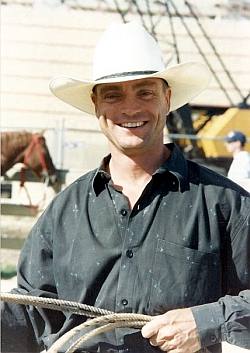
That opening paragraph, from a January 1990 interview with Greg in the Advocate, still stands true today, even though it was written prior to Greg's death in the Spring of 1995. Following that article, Greg added four more IGRA All-Around award buckles to his collection, making him the winner of every IGRA Finals Rodeo from its inception through 1993. Along the way, Greg earned dozens of individual rodeo All-Around Cowboy buckles, event buckles, and literally hundreds of event ribbons, making him the most winning cowboy in the history of IGRA.
While previous Finals Rodeos have honored those behind-the-scenes people who help keep gay rodeo going and expanding, in 1994 we chose to honor a person who gave us one of our reasons for having gay rodeos in the first place. Greg was seemingly born for gay rodeo, or perhaps the opposite is true, maybe gay rodeo was born for people like Greg. Sprouting up from the Midwestern town of Ericson, Nebraska (pop. 130), Greg lived the "country lifestyle" working on his family's farm and ranch. While comfortable in this environment, Greg always seemed to know he was "different" somehow. He accompanied his family to many local rodeos over the years and watched his brothers compete, but never competed himself, telling writer Allen Kalchik in a RoundUp magazine interview earlier that "I remember thinking, 'Oh, that's WAY too scary for me!'.
Perhaps it was the environment that was 'way too scary' and not the arena events, as Greg would soon discover gay rodeo, and begin to change.
A visit to the Reno Rodeo in the mid-80's got his interest up enough to visit Arizona's first gay rodeo in 1986. While there, a friend talked him into helping him out as a contestant in a 'camp' event. It was then that Greg's country lifestyle merged with his gay orientation. Within a matter of weeks, he had moved to Arizona, begun working at Charlie's Phoenix, a gay Country/Western bar, acquired the nickname 'Sheena', joined the Arizona Gay Rodeo Association (AGRA), and started his years of gay rodeo competition.
Later, as Greg started to slow down in the arena and make room for the up and coming crop of contestants, many of whom he had helped bring into the IGRA circuit, he was increasingly looked upon as the ideal of what gay rodeo is all about.
Greg was the gay Marlboro Man. That cute little cowboy, stuffed into those 27-inch waist Wranglers, had those solid, decent, Midwestern values and abilities coupled with that special 'gay' sense of humor and style that personifies the IGRA family. We honor Greg as the 1994 IGRA Finals Rodeo Grand Marshall, not just for his winning ways in the arena, but also for his winning style outside the arena.
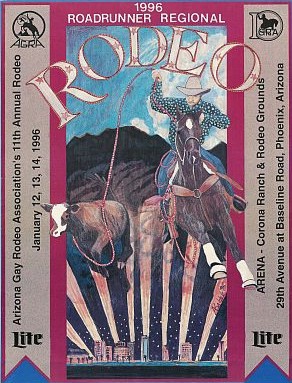
IGRA Finals All Around Cowboy Greg Olson
by Allen Kalchik
To hear Arizona wrangler Greg Olson tell it, all it took for him to become the International Gay Rodeo Association's top-winning cowboy was the desire to win and a commitment to keep trying. Sounds pretty simple, But when you look at Greg's amazing record of accomplishments, at the hundreds of buckles and dozens of all-around titles he collected in seven years of gay rodeoing (not to mention the tens of thousands in prize money), you get the idea there must have been more to his success than simple desire.
Maybe it was in his blood. Greg grew up in rodeo country on a working farm/ranch near tiny Ericson, Nebraska (population 130). Carol Olson, Greg's Mom, tells a story of when she was pregnant with Greg in the hot summer of 1960. "We used to go to these local rodeos in Burwell, about twenty-five miles west. We went every year, but the doctor wouldn't let me go that time because I was pregnant. I was almost due, and he was afraid I'd have the baby in that big crowd of people." Mrs. Olson pouted and skipped the rodeo. Greg was born the following week and the growing family didn't miss many of the big local rodeos after that.
Surrounded by animals on his parents' spread, little Greg dreamed of becoming a vet one day but shelved that goal because his grades were poor. The third oldest of six kids, he used to ride the bucket calves in their pens and later broke horses for his father. In his teen years, he watched one of his brothers compete in local bronc-busting competitions while another signed up for the bullriding events. "1 remember thinking, 'oh, that's way too scary for me," he recalled, chuckling at the memory. He didn't even consider rodeoing back then. Instead, he was growing up. But he dated girls and tried to fit in with the other kids, all the while trying to figure out how to deal with It.
After graduating high school, he and a couple of gay friends would drive to the nearest big cities about one weekend a month. They'd hit the gay clubs and dance, meet other gay men and explore what they saw as an alternative to the straight, midwestern farming lifestyle they knew. It was then, when Greg was in his early twenties, that he learned of the second gay Finals Rodeo being held in Nevada. He headed to Reno to check it out.
Initially excited by the concept of a gay rodeo, Greg was somewhat disappointed by the Reno trip. "It wasn't anything like the normal rodeos we always went to and watched back home," he relates, remembering in particular the emphasis on the camp events, but as the interest in gay rodeoing grew, it was taken more seriously by many of the competitors and the sport evolved quickly.
When Greg visited Phoenix in January of 1986 to watch the Arizona Gay Rodeo Association's first regional rodeo, he was impressed. So impressed, in fact, that he moved to Phoenix a few weeks later, introduced himself to the people involved and signed up for several events at the Oklahoma rodeo that August. "1 started with camp events, moved into rough stock and before long, I was riding bulls. By the end of that first year, I was on everything." It would appear that, in the gay environment, bull riding was no longer "way too scary" for this Nebraska farm boy. The rest, as is often said, is history.
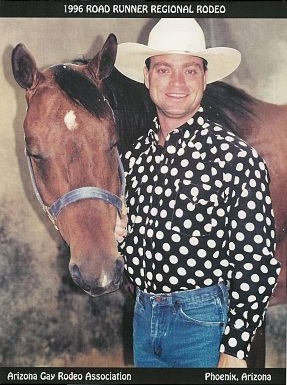
Perhaps it was his total commitment to his sport that kept Greg on top. He said he eats, sleeps and breathes rodeo. He hauled his stock thousands of miles across the country each year, competing more frequently as the IGRA expanded. He tended bar at Charlie's in Phoenix on a part-time basis, though he once worked full-time (and then some) as a manager there. He said of his years at the popular gay western bar. "they were the best. Charlie's was really good for me, for bringing me out of my shell and revealing the more outgoing person that l am." He had to drastically cut his hours at Charlie's, however, in order to pursue more buckles at an increasing number of rodeos. In 1990, he went to Farrier school and then set up his own shoeing business, a business where he was the boss and only employee, and therefore able to set his own hours.
He shared a rambling, adobe-styled ranch house on the southwestern edge of Phoenix with any number of roommates - sometimes even Greg lost track of who actually lived there at any given time. There was a large pasture and several stalls on the property that housed an ever-changing assortment of horses, cattle and even a burro or two. The entire place could be the setting for some tough-talking fifties Western, especially the spacious living room with its rough-hewn paneling, lodge-pole furnishings, trophy mounts and cowhide rugs. There was an unmistakable odor present; a mixture of horses, leather and men. You betcha, Pardner; this is real cowboy bunkhouse, just like in the movies. Only in the movies, the cowboys never called each other "sister" and they didn't share their beds with other cowboys the way they do out at Greg's.
He'd created a pleasant niche for himself and it was obvious he was happy and quite comfortable with his rodeo-oriented, horse-loving, southwestern life. Not exactly this society's common notion of a "gay lifestyle." But it was nothing out of the ordinary for Greg. "I know lots of gay men - and a whole lot of lesbians, too - who are living this way, living on ranches. They have their places and their stock and they're really happy." He added, "once you start to get into it (rodeoing), you want to take it more and more seriously and do it full time. And once you've had a taste of winning, and gotten some of that prize money, you want to keep trying even harder to win."
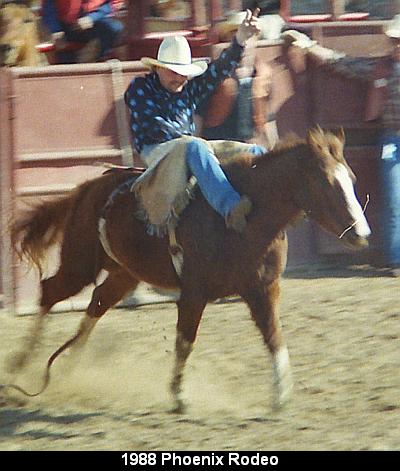
And win he did. A bit of history: In 1987, he captured his first All-Around Cowboy title with the help of J.J., a talented bay gelding given to him by his father. Another All-Around followed, and then another, continuing for season after season. It was five full years before Greg was beaten for the top spot by another cowboy at any rodeo where he competed. He'd earned more silver buckles than he could possibly wear and gave several away each year to friends and charity auctions. He also walked away with the title of All-Around Cowboy at every IGRA Finals from 1987 through 1993, despite injuries to both his horse and his person.
The handsome blonde's worst injury came in the fall of '91, when he snapped his leg in the bullriding event at a Phoenix-area straight rodeo. He'd won the competition three weeks running and was considering branching into other rodeo circuits, until that fourth weekend when something went wrong. He'd completed his ride, and was dismounting the bull when he became trapped by the huge animal spinning around him. He was swept under it somehow, and the full force of the bull's weight came down on his lower leg, audibly shattering the bone in several places. He gave up on the idea of competing on other circuits for awhile and committed to recuperating in time to qualify for the IGRA '92 Finals. He did, and amazingly won the All-Around title that year as well.
Until the broken leg, bullriding was Greg's favorite event. Eventually, he said, he preferred the roping events. But he would laugh when he was reminded that he'd injured himself roping, too. "That was when the end of my thumb got cut off at the Finals, in Wichita in '91," he recalled, But didn't that first real injury (not counting a few kicks and bruised ribs) change the way he felt about his chosen sport? "0h, no. In fact, I wanted to go back in the arena and run my barrels and stop my steer but they wouldn't let me do it," Indeed, cooler heads prevailed and he was rushed to a local hospital for emergency surgery. He regained full use of the thumb - the three quarters or so he had left of it, anyway.
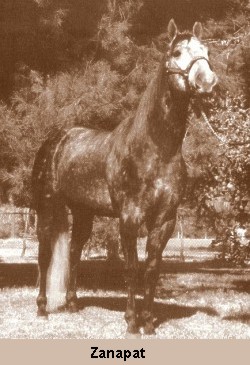 Another setback occurred early in the 1994 season when J.J., his good rodeo horse, went lame. He stayed off the reliable gelding for six months and then tried to bring him back slowly but the leg injury was too severe. J.J. had to be retired and Greg started training a new three year-old for the next season named Zanapat.
Another setback occurred early in the 1994 season when J.J., his good rodeo horse, went lame. He stayed off the reliable gelding for six months and then tried to bring him back slowly but the leg injury was too severe. J.J. had to be retired and Greg started training a new three year-old for the next season named Zanapat.
After he was kicked in the ankle during the bronc-riding event in a Palm Springs rodeo, complications to the healing process kept him sidelined for awhile. Greg knew it was a dangerous sport, but he never lost his enjoyment of rodeoing. "We do take it seriously," he said of the business of gay rodeo. By "we", he was including himself with some of the other top gay cowboys on the IGRA circuit, including the roping team of Dennis Terrell and Andy Anaya. Terrell and Anaya often finished right up there with Greg when the points were tallied, and both cowboys have bested him in All-Around competitions. Both also made their home at his ranch. Another roommate was Greg's longtime friend (and his partner in the camp events since the early days of his involvement), past AGRA President Dan Iversen. Greg's team roping partner, Larry Jones, was a frequent visitor to the house.
It's this particular group of top finishers that has taken some heat from other rodeo competitors. Some say the Arizona contingent has brought too much professionalism to the gay circuit, Greg didn't agree. "We get more serious about it, but I think everybody does as they get more involved in it and make more money. And there are people competing at all levels. Nine times out of ten, we get beaten at goat dressing by people who have no knowledge of stock or rodeoing. They get those panties on and run, and they're just as excited by that as we are about catching a steer or riding a bull, And we also don't take it so seriously that it isn't any fun. We still make a lot of fun of it."
So, maybe his unprecedented winning ability at gay rodeos came out of some natural, inborn talent. Maybe it was also something this motivated, good-looking cowboy earned by making the IGRA circuit his life and working very hard at it. Clearly, when you look at his background, a number of factors have combined to put Greg Olson at the top of his sport. And sure, there are other factors involved, too. They're the sort of things that contribute to the character makeup of top athletes in any game; things like "having a heart" and "facing the fear" and "believing in yourself." But if you wanted to talk to Greg about any of that mushy stuff you wouldn't have gotten very far. He preferred to keep it simple and to let his record speak for itself.
Did Greg know he was good at what he did? He would laugh and say, "I signed up for a couple of events in 1986, and right away I won. So, something was happening, right?" That's about as philosophical as he was going to get. His advice to other competitors? "If you've got the talent, if you're gay and you want to compete, you can do it just like I did. Anybody could do it." And hearing him say it the way he did, you almost start to believe that maybe anybody can.
The History of Sheena
(Greg's nickname)
Not long after arriving in Arizona in 1986, a young midwestern farmer named Greg Olson walked into Charlie's in Phoenix and looked around. The IGRA's future top cowboy knew he'd found a home. Like many gay country western-styled nightclubs popular around the country, Charlie's provides an atmosphere that feels comfortable to those gay men who were raised in rural areas, and yet never seemed to fit in at their straight, hometown pubs.
That's how it felt to Greg, anyway, and before long the boy from Nebraska was happily ensconced on Charlie's staff. Starting off as a cocktail waiter, the slim, muscular, blonde was teased by the other employees because of the way he darted around the bar, attempting to avoid various pinches and gropes of the bar's most forward patrons. "You look like Sheena of the Jungle," one of the bartenders laughingly told him, because of the way he ran through the "jungle" of men "with his tray up in his hair." Greg's nickname was born, and it stuck. He would be known to Charlie's customers and to rodeo spectators alike as "Sheena" from that moment on.
Within a few short years, Sheena became a popular bartender at the club and then worked his way up into management. He later gave up his position on the staff' as his involvement in gay rodeo grew, but he managed to stay on at Charlie's as a part-time bartender for awhile. While there, this creative cowpoke, invented a shot (that's a "shooter" to some of us) that's still served regularly at the bar today, as well as at Charlie's in Denver and Charlie's in Chicago, and a few other bars that Sheena had probably never even been to around these United States. It's rodeo tradition and they've named it after him.
To make a Sheena, you need a couple of Greg's favorite liquors: 1) chilled Root Beer Flavored Schnapps 2) good ol' Southern Comfort. Pour the Schnapps into a shot glass, about 3/4ths full. Top it off with a healthy splash of the 'Comfort, and that's all there is to it. Set 'em up and down the hatch! On second thought order an extra and have it sent over to that hot-looking bullrider across the way. And be sure to think of Sheena if it works.